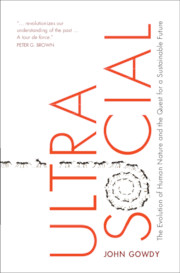Book contents
- Ultrasocial
- Reviews
- Ultrasocial
- Copyright page
- Dedication
- Contents
- Figures
- Tables
- Preface
- Acknowledgments
- Part I The Evolution of Human Ultrasociality
- Part II The Rise and Consolidation of State/Market Societies
- Part III Back to the Future
- 8 Taming the Market
- 9 Evolving a Sustainable and Equitable Future
- 10 Reclaiming Human Nature
- Notes
- References
- Index
9 - Evolving a Sustainable and Equitable Future
What Can We Learn from Nonmarket Cultures?
from Part III - Back to the Future
Published online by Cambridge University Press: 09 October 2021
- Ultrasocial
- Reviews
- Ultrasocial
- Copyright page
- Dedication
- Contents
- Figures
- Tables
- Preface
- Acknowledgments
- Part I The Evolution of Human Ultrasociality
- Part II The Rise and Consolidation of State/Market Societies
- Part III Back to the Future
- 8 Taming the Market
- 9 Evolving a Sustainable and Equitable Future
- 10 Reclaiming Human Nature
- Notes
- References
- Index
Summary
Even if all the reforms outlined in Chapter 8 were enacted, the growth imperative would still drive the economic system. This chapter explores ways to move toward an evolutionary path leading to an entirely new system not based on growth and exploitation. It does not offer a blueprint for a utopian future but rather examines the human potential for radical social change given our physical and psychological characteristics, particularly brain plasticity and “evolvability.” Examples of sustainable human societies with very different economic systems from market capitalism are discussed, including Tikopia, Ladakh, and the Inca Empire. These cases illustrate the human capacity for innovation and radical change. As we face an uncertain future, nonmarket economies can at least show us that sustainable and equitable societies are possible. It is not human nature that is preventing us from constructing a better world.
- Type
- Chapter
- Information
- UltrasocialThe Evolution of Human Nature and the Quest for a Sustainable Future, pp. 166 - 192Publisher: Cambridge University PressPrint publication year: 2021



